Erika Robuck's Blog, page 27
August 21, 2011
Book Review: THE TIME IT SNOWED IN PUERTO RICO
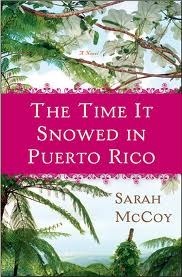
THE TIME IT SNOWED IN PUERTO RICO by Sarah McCoy was published in August of 2009. I heard about the book because I met Sarah on Twitter and enjoy her positive, encouraging tweets for writers. I bought it because of the great reviews.
The novel is set during the 1960s in Puerto Rico, and is told from the perspective of eleven-year-old Verdita. From the moment the book begins, the reader is transported to the lush island setting and to the tween years–a very difficult time in the development of any child. With one foot in childhood and one foot in adolescence, Verdita tries to make sense of the men, women, and relationships around her. Her confusion places her in turmoil and she lashes out in thought and in deed to her mother when she finds out her mother is pregnant. Verdita comes of age through a series of hard lessons but always within the circle of an imperfect but tender family.
I'm not usually a fan of child narrators, but Verdita is extremely well written. Her sassy thoughts, faulty logic, and misplaced frustration make her extremely lovable and I couldn't stop reading to find out how she'd make it through the story. McCoy's development of character and setting are superb, and Verdita's family was so rich and authentic they felt as if they'd come off the page. From home cooking, to holiday celebrations, to tragedy, the world of Verdita's family was fully rendered and compelling.
I highly recommend THE TIME IT SNOWED IN PUERTO RICO if you enjoy original coming of age stories. Sarah McCoy set the bar high with her debut. I look forward to reading McCoy's second novel, THE BAKER'S DAUGHTER, when it comes out early next year.








August 16, 2011
Book Review: RULES OF CIVILITY
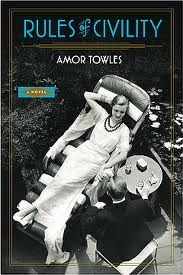
"For however inhospitable the wind, from this vantage point Manhattan was simply so improbable, so wonderful, so obviously full of promise–that you wanted to approach it for the rest of your life without ever quite arriving." Amor Towles, RULES OF CIVILITY
RULES OF CIVILITY by Amor Towles was published last month. I bought it because it's gotten rave reviews and because I love a good period piece, particularly when it is set during the thirties in New York. Even with my high expectations, this book exceeded them in every way.
RULES OF CIVILITY is the New York story of Katey Kontent–the young, sharp daughter of a Russian immigrant–and the rise and fall of the people around her. The cast of characters in her orbit are a fascinating bunch. Some of the key players are: Eve, the sassy, opportunistic roommate; Tinker, the friendly, wealthy man-about-town; Wallace, a young man of old money and deep sincerity; and Anne, a shrewd socialite and self-made queen of Manhattan.
Katey, Eve, and Tinker meet over jazz and booze and begin a casual friendship that becomes much more after a terrible accident. Duty and obligation bind them to each other while Katey tries to find a place for herself in New York's elite, wealthy crowd. Her intelligence and decision making gradually take her from a modest secretarial job to a career she loves, but she learns along the way–the hard way–that less is in her control than she believes.
Katey is a new all-time favorite character in literature of mine. Her wit, authenticity, charm, and cool in all situations make her a brilliant, larger-than-life protagonist. I cared about Katey from the beginning and wanted her to succeed. One of the things I found most fascinating about her character is that the author is a man but writes so securely and believably as a woman. I haven't seen this so well done since Wally Lamb's SHE'S COME UNDONE.
What I also loved about RULES OF CIVILITY were the continual surprises. I did not predict anything that happened. I could not guess how any of it turned out. The plot and setting felt fresh, and I found myself rooting for even the villains in the book because each character was so layered and well done. I understood everyone's motivations and actions, and all of it felt believable.
Each scene in RULES played as vividly as a movie in my imagination, and I hope to see a film version some day. I saw the cast of AN EDUCATION as the characters in the story and I could almost hear the soundtrack of thirties jazz and swing.
RULES OF CIVILITY is my favorite kind of book and I'll be singing its praises for all who will listen. Pick up a martini, put on some old jazz, and allow yourself to get lost in Katey Kontent's world.








Twitter No-No's
I have a short, negative post today, but I think it will help people get more out of Twitter and increase their follow-back potential. In no way am I a Twitter expert or a perfect Tweeter, but I see some people make glaring Twitter errors. I'm here to help.
I noticed that I have quite a few more Twitter followers than I follow back. This is not because I am a snob of any kind. I want to follow back everyone who follows me. However, when I get a follow notification I click over to the follower's profile to "meet" him or her. If I find or do NOT find the following things, I often do not follow. Understand that while most of this is personal, I see large amounts of people on Twitter complain about these very items, so they might be worth a look. They also might be worth a look if you are following three times the amount of people who are following you.
Here is a list of reasons I do not follow based on the first impression:
You don't have a description or website.
You don't have a picture or graphic of some kind.
Your picture suggests violence or pornography.
You have nothing to do with writing.
If you pass the first impression, I scroll down and read your tweets. I will not follow you if:
Every/every other tweet is a link to purchase one of your books/ebooks.
You quote often from your own material.
You only RT.
You never RT.
You list yourself as a writer but your feed is full of posts about, say, football.
You have more political tweets than writer tweets.
If you pass the "feed" test it's almost guaranteed I'll follow you. I will immediately unfollow you, however, if you DM with a "Thanks for the follow. Check out my book/blog/website at www…."
I hope I don't seem harsh, but I'm actually posting this to help Twitter newbies. Again, I am not the authority on Twitter and I'm absolutely certain I do things that annoy others and lead them to unfollow me. I just think that some writers think of Twitter as a marketing tool but it isn't unless you don't use it as a marketing tool. You know what I mean?
How about you? What makes you automatically follow/unfollow someone on Twitter?








August 9, 2011
Book Review: GAME OF SECRETS
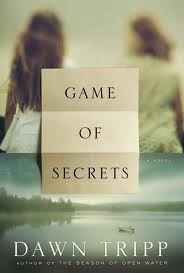
"[She] watched the light as she waited–how it started in the morning, just touching in that most intimate way the outer edges of things, touching like it swore, I will not go farther, yet by noon already breaking, driving deep toward the heart of the shade."
Dawn Tripp, GAME OF SECRETS
Dawn Tripp's GAME OF SECRETS was published last month. I've been connected to Dawn on Twitter and Facebook for some time and was intrigued by both the premise of the novel and the positive reviews. A literary mystery, family secrets, a Scrabble Game…these are just some of the descriptions that enticed me to read it, and Tripp delivered.
Set in a small New England town, GAME OF SECRETS is a novel told from multiple points of view in different time periods. Two aged women playing a game of Scrabble with a tangle of shared, unspoken, family tragedies, a pair of young lovers meeting in secret in an old barn, an unearthed skull with a bullet hole revealing a decades-old murder, and a guarded daughter trying to find where she fits into her town and her family provide the framework of the book. The stories weave together through time like the tiles of the game, surprising the reader how they fit together at every turn.
There are some books I love for the characters, the people who seem real enough to step off the page and into the room. There are other books I love for the author's use of setting as a canvas that sets off the colors of the story like no other background could. Sometimes I love a book for plot and pacing that keeps me turning pages late into the night.
All of these elements are present in GAME OF SECRETS, but if I had to pick what I loved most about this book, it would be the prose. Dawn Tripp's command of language takes a story that has all of the above elements used well, and further elevates it.
From gentle, sensitive Jane: "…even in dead winter, her favorite season, that certain honesty of winter, all things stripped back to being only what they are…"
From Jane's turbulent, difficult daughter, Marne: "…I set the blade of my brother's pocketknife in tight against the binding, I realized: Grafting someone else's thoughts might just be the fastest way to cut yourself free of your own."
From Jane's father, the murdered man: "He could tell her that this dinge of a room where they meet, this brief occasional time, an hour or two at most, this stolen time, is where he lives."
Every description, every use of figurative language, every theme supports the story around it including the character whose narrative encompasses it.
I found almost all of the characters endearing except one, and even that character had redeemable qualities. I cared most for Marne, even when she was judgmental of and impatient with her mother, because Marne always tried to understand more by pouring over her mother's notes in an old library book. Marne tried to find the thread that connected her to her mother–a thread that Marne intuitively felt but had a hard time recognizing in her conscious mind.
If you enjoy layered books and elegant prose, I highly recommend GAME OF SECRETS. It will keep you thinking about its characters long after you've turned the last page.
For more on Dawn Tripp, visit her website at http://www.dawntripp.com/.








August 4, 2011
Book Review: THE LANTERN
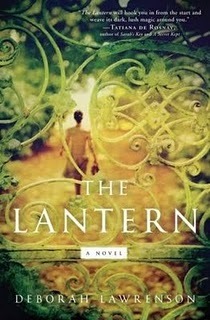
"[A]gain, there was a movement at the periphery of my vision. A light, this time. A glimmer of light that was moving slowly up the path, swinging slightly as if held by a night watchman…As I waited, shivering, it seemed to wait, too, suspended in the black air. Too low for a star, too near to be light from the hamlet on the facing hills across the valley. Then the light dimmed." Deborah Lawrenson, THE LANTERN
THE LANTERN, by Deborah Lawrenson, is scheduled for publication in September of 2011. I received a copy for review from the publisher. It was introduced as a "modern Gothic" tale in the tradition of REBECCA or THE HOUSE AT RIVERTON and it certainly lived up to its expectations.
Set on the fragrant, lavender-covered hills of Provence, THE LANTERN is a tale told in two time periods in an old farmhouse after a woman, Eve, meets and falls in love with a mysterious pianist, Dom, and they move to the area to be together. Eve soon learns of Rachel, Dom's ex-wife, though he won't speak of her. As Eve and Dom repair the house, Eve finds out that Rachel and Dom had been to the area before and that Rachel disappeared mysteriously. Because there have been local girls who've disappeared and the owner's of the farmhouse, themselves, disappeared, Eve begins to suspect the worst. When an excavation at the pool unearths a terrible discovery and a series of unexplained events lead Eve to believe the house is haunted, she begins to fear for her own safety.
THE LANTERN is, indeed, a Gothic suspense story. Questions arising throughout the narrative kept me turning pages long into the night. I enjoyed both the historical and present day narratives equally, and found myself rushing through each section to get to the characters of the other time period. Several parts in the book are downright scary, and many of the historical occurrences at the house are deeply troubling. Lawrenson does a masterful job of concluding her story, however, in satisfying and believable ways.
If you enjoy books like THE DISTANT HOURS or THE THIRTEENTH TALE, you will love THE LANTERN. Just be prepared to throw your blanket over your head if you're a night reader.
August 2, 2011
Research Trip: Princeton University
Come with me on a research trip to Princeton University.
Make the approach under a canopy of trees on a drive one could easily imagine Model Ts or horse-draw carriages traveling. Cross a slim channel and a set of athletic fields, freshly mowed and lined. Walk with me up a hill, past historic brick and stone houses where the echoes of rowdy egoists still linger on the leaded glass windows and important stone crests.
Enter the great Princeton Arch, just one of many passages from here to there on campus, that act as portals or as frames for the views through them.
Pass the ivy covered buildings and social halls until you enter the great shadow of the chapel, imposing its silent discipline on the courtyard.
As you approach the Library you are conscious of those who've tread these cobblestones before you, the sounds of their footsteps mingling with your own, the air of old money.
On the approach to the Special Collections Wing, you walk through an exhibit on Irish writers. The eyes of James Joyce, Samuel Beckett, and Oscar Wilde stare out from old sketches and photographs as you pass, quieting you. You may not bring your camera or personal possessions into the research room. You are only allowed a pencil and paper provided by the University for what you seek.
While you wait for the assistant to bring your materials you bask in the unexpected pleasure of the primitive note-taking materials: the scratch of the pencil over the orange paper, its woody scent mingling with the wood of the wall panels. You reflect that the act of erasure is a lost art–the revelation of old words under new words, that not all thoughts are finished thoughts. There is purity in these layered marks.
When the folders are brought, you are astonished to see exactly what you crave is here waiting for you. The records begin in 1932, right in the time and place your new novel begins. Then you accept the gift because you know down to your bones that when the Universe winks at you, you are on the right path.








July 25, 2011
Guest Blogging Today
The fabulous fiction blog, What Women Write, invited me to do a guest post. Please follow the link to read about what started my obsession with historical fiction. I spill a big family secret, too. 
http://whatwomenwritetx.blogspot.com/2011/07/guest-blogger-erika-robuck.html








July 21, 2011
Book Review: LEONARDO'S SWANS
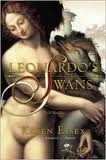
"Perhaps in exploring the interior of the body, he is searching for its essence, that ineffable thing that animates the eyes, the expression, the gestures. Perhaps he is looking for the soul." Karen Essex, LEONARDO'S SWANS
LEONARDO'S SWANS by Karen Essex was published in 2006 and is 340 pages. I read and enjoyed her most recent novel, DRACULA IN LOVE, and won this novel in a giveaway. This book marks another tour de force in a summer of incredible, historical reading.
Set in Renaissance Italy, LEONARDO'S SWANS is an epic tale of sibling rivalry, ambition, politics, art, and love. Isabella d'Este is the primary point of view character. She is incredibly talented, beautiful, and shrewd. She is pleased with her betrothed until she realizes that the betrothed of her younger sister, Beatrice, is not only a better match for her in intellect and passions, but is also the patron of the genius Leonardo da Vinci. Isabella's obsession with art makes her consumed with desire for a sitting with Leonardo so that she might be immortalized by his hands. In a tale that spans decades, Isabella plots and connives to attempt to control her fate and to make Italy a mecca for culture and wealth.
Isabella is a beguiling and fascinating protagonist. In spite of her schemes, I couldn't help but enjoy her. Essex does a masterful job of showing the maturation of flawed characters, and the changing fates of the sisters play like an intricate chess game. Essex's research and attention to historical detail is impressive but never oppressive.
LEONARDO'S SWANS is historical fiction at its finest. It is the perfect blend of story and history, and sent me searching the internet for hours afterward to learn about the characters and the works of Leonardo da Vinci.
If you are an art or history enthusiast, or if you enjoy writing in the style of Philippa Gregory, you will love LEONARDO'S SWANS.








July 13, 2011
Book Review: OUTER BANKS HOUSE

"I knew it was the ocean there, beneath the blue. I had never seen it in my life, and my heart began to beat faster in anticipation. I took a deep breath of the salty air, picked up my skirts, and started to run. I ran the way that I used to run when I was nine years old, when nothing mattered but the day on the plantation." Diann Ducharme, The Outer Banks House
The Outer Banks House by Diann Ducharme was published in June of 2010 and is 291 pages. I found it in an independent book store, Quartermoon Books, in Topsail Island, North Carolina. It is a story set in Nags Head in 1868, and I had the pleasure of reading it while on vacation at the North Carolina coast.
Three years after the Civil War, seventeen-year-old Abigail Sinclair and her former slave-owning planter family spend the summer in Nags Head exploring new opportunities for business. Abigail finds herself immediately captivated by the primitive island setting, much to the dismay of her stiff, formal mother. When her father hires Benjamin Whimble as an island guide to show him the best places for hunting and fishing he soon learns the young man wishes to better himself by learning to read. He forces Abigail to teach Benjamin, much to her dismay, and the two unexpectedly fall in love. Abby's father's help of Benjamin, however, takes a sinister turn when he wishes to use the young man for his evil KKK dealings. Benjamin and Abigail find themselves in the middle of a terrible conspiracy that tests their love and threatens to destroy all they hold dear.
It gives me such pleasure to discover a book I've never heard of and read it in its setting. Every time I opened the pages of The Outer Banks House I fell back through time to the primitive beaches of Nags Head before the great rush of tourists. I enjoyed learning the history of the settlement and of Roanoke Island, and the moving stories of the freed slaves. Ducharme brilliantly depicts the growth of Abigail as a spoiled plantation owner's daughter to a woman of character and understanding.
If you enjoy early American history in the post-War South or reading about the North Carolina coast you will love this book. I highly recommend The Outer Banks House.
July 12, 2011
Book Review: Letters From Home

Letters From Home by Kristina McMorris was published in March of 2011 by Kensington. I bought the novel after meeting Kristina in New York and hearing that Letters was set during WWII. It is the story of the loves and losses of three roommates during the war, and is one of the most touching books I've read this year.
The book opens at a crowded USO dance. Liz is the literary, thoughtful girlfriend of a rising politician. Betty is a beautiful singer and waitress. Julia has a talent for design and is engaged to be married to a soldier. When Liz meets soldier Morgan McClain she feels an instant connection to him but dismisses it in light of her relationship and the fact that Morgan is about to report for duty.
When Betty needs rescuing from a group of overeager men at the dance, Morgan intervenes and dances with her to protect her from the group. Liz sees them dancing, makes assumptions, and leaves without ever telling Morgan her name. Betty is smitten with Morgan and asks Liz to write a letter to him on her behalf.
When Morgan gets the letter, he is surprised at the depth of feeling the shallow, pretty singer conveys, especially since he's been pining for Liz. He can't help but enter into a correspondence with her. When Betty decides to enlist to help out in a field hospital to make something of her life, Morgan's letters arrive in her absence. At Julia's urging, Liz continues the correspondence and she and Morgan fall in love in spite of her masquerade.
I've read countless novels about WWII, but this is one of the most moving. The characters are richly rendered, the plot is full of tension and complexity, and the relationships of love and friendship are absorbing and original. I am not often moved to tears from my reading but Letters From Home made me cry four times. A perfect blend of tragedy and triumph, McMorris' debut reveals a well researched novel on new fronts in WWII, and I can't wait to read more from this gifted novelist. If you enjoyed The Postmistress or The Soldier's Wife, you will love Letters From Home.


































